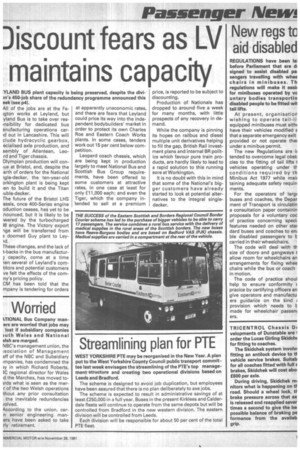Discount fears as L maintains capau
Page 13

If you've noticed an error in this article please click here to report it so we can fix it.
;YLAND BUS plant capacity is being preserved, despite the divi• )in's 450-job share of the redundancy programme announced this eek (see p4).
All of the jobs are at the Fa1gton works at Leyland, but yland Bus is to take over resinsibility for dedicated bus anufactu ring operations cartd out in Lancashire. This will dude hydracyclic gearbox, ecialised axle production, and sembly of Atlantean, Leord and Tiger chassis.
Olympian production will con'Lie at Bristol, and, despite the ,arth of orders for the National igle-decker, the ten-year-old orkington plant is being kept len to build it and the Titan iuble-decker,
The future of the Bristol LHS assis, once 400-Series engine oduction ceases, has yet to be flounced, but it is likely to be iwered by the turbocharged 38 engine. The Victory export nge will be transferred from a doomed Guy plant to Leyd.
These changes, and the lack of t-backs in the bus manufactur capacity, come at a time len several of Leyland's corntitors and potential customers ve felt the effects of the cornny's pricing policy.
CM has been told that the mpany is tendering for orders at apparently uneconomic rates, and there are fears that Leyland could price its way into the independent bodybuilders' market in order to protect its own Charles Roe and Eastern Coach Works plants. In some cases, tenders work out 15 per cent below competition.
Leopard coach chassis, which are being kept in production largely to meet National Bus and Scottish Bus Group requirernents, have been offered to some customers at attractive rates, in one case at least for only £11,000 each; and even the Tiger, which the company intended to sell at a premium price, is reported to be subject to discounting.
Production of Nationals has dropped to around five a week for many months, with little prospects of any recovery in demand.
While the company is pinning its hopes on railbus and diesel multiple unit derivatives helping to fill the gap, British Rail investment plans and internal BR politics which favour pure train products, are hardly likely to lead to a rapid solution to this running sore at Workington.
It is no doubt with this in mind that some of the National's bigger customers have already started to look at potential alternatives to the integral singledecker.








































